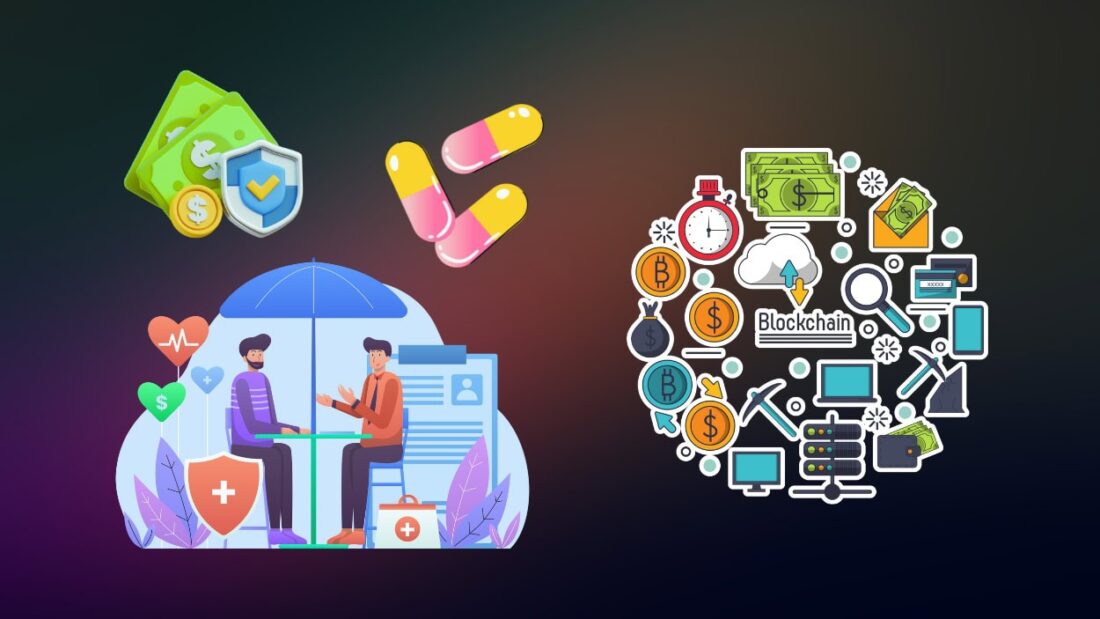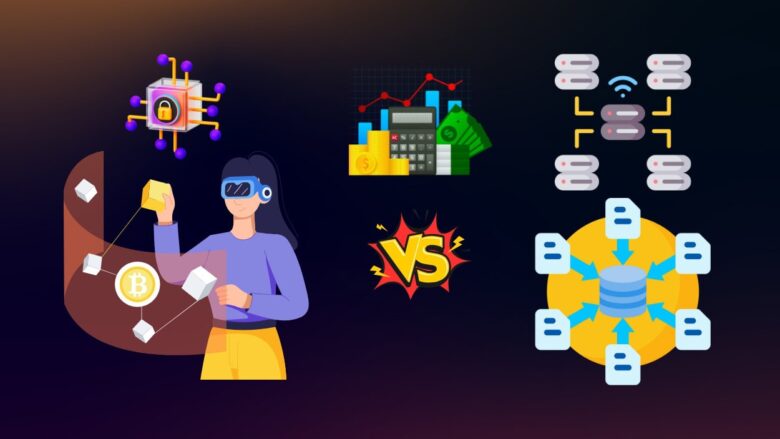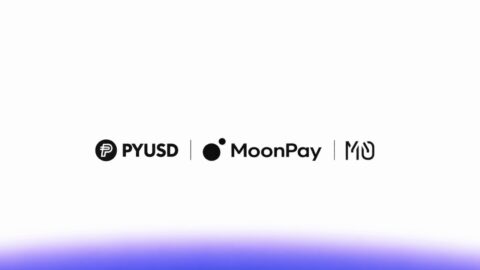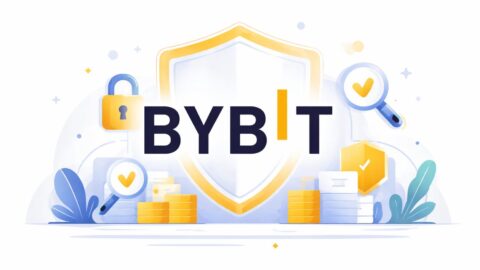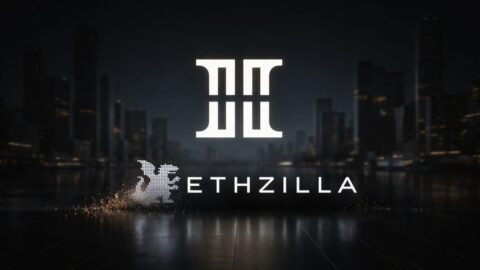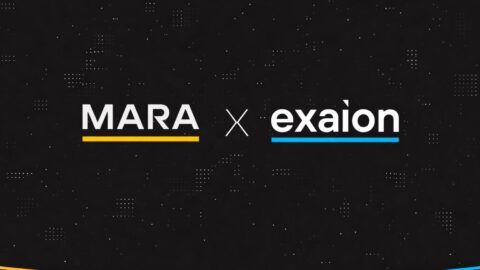Blockchain technology is reshaping industries worldwide, but nowhere is its impact more critical than in healthcare finance. Imagine a world where patient data is both secure and accessible, insurance claims are processed in minutes instead of weeks, and every healthcare transaction is transparent. This is the promise that blockchain brings to healthcare finance.
The technology’s application in healthcare finance is growing rapidly, fueled by the demand for data security, cost-efficiency, and seamless patient care. Here, we dive into key statistics, financial milestones, and projections to understand how blockchain is transforming healthcare finance.
Editor’s Choice
- The blockchain healthcare market reached approximately $5.50 billion in 2025, growing at a 52.5% CAGR toward 2030.
- Global blockchain in healthcare is expected to hit about $5.61 billion by 2025, reflecting a robust 63.85% CAGR since 2018.
- The healthcare data monetization market was valued at $0.58 billion in 2025.
- While blockchain interest is rising, only 39% of global businesses have blockchain in production or pilots, far below 90%.
- Clinical Data Exchange accounted for 46% of the blockchain healthcare market share in 2024, driving adoption into 2025.
- Asia-Pacific is the fastest-growing region with an anticipated high CAGR in blockchain healthcare through 2030.
- The overall blockchain healthcare market at $14.25 billion by 2030, suggesting the EHR segment would be much smaller.
Growth Drivers and Challenges in Blockchain for Healthcare
- 55% of health executives indicated plans to adopt blockchain for improving data security and privacy within the next few years.
- Interoperability continues to lag as only 38% of healthcare providers are using blockchain for seamless data sharing across systems in 2025.
- Cyber threats amplify interest in blockchain’s security benefits amid a record 264% surge in ransomware attacks in 2024, prompting stronger HIPAA enforcement in 2025.
- Smart contracts drive efficiency with blockchain projected to improve processes such as billing and claims adjudication, contributing to the overall market reaching $23.2 billion in 2025.
- Regulatory uncertainty remains a barrier as intensified enforcement through new HIPAA security rule proposals adds cost and complexity for smaller healthcare entities.
- Cost-saving potential grows with the blockchain technology in the healthcare market, valued at approximately $194 million in 2025, reflecting investments aimed at reducing administrative expenses.
- Skilled workforce shortage persists as many organizations struggle to adopt blockchain solutions due to a lack of trained specialists, slowing integration despite rising market demand.
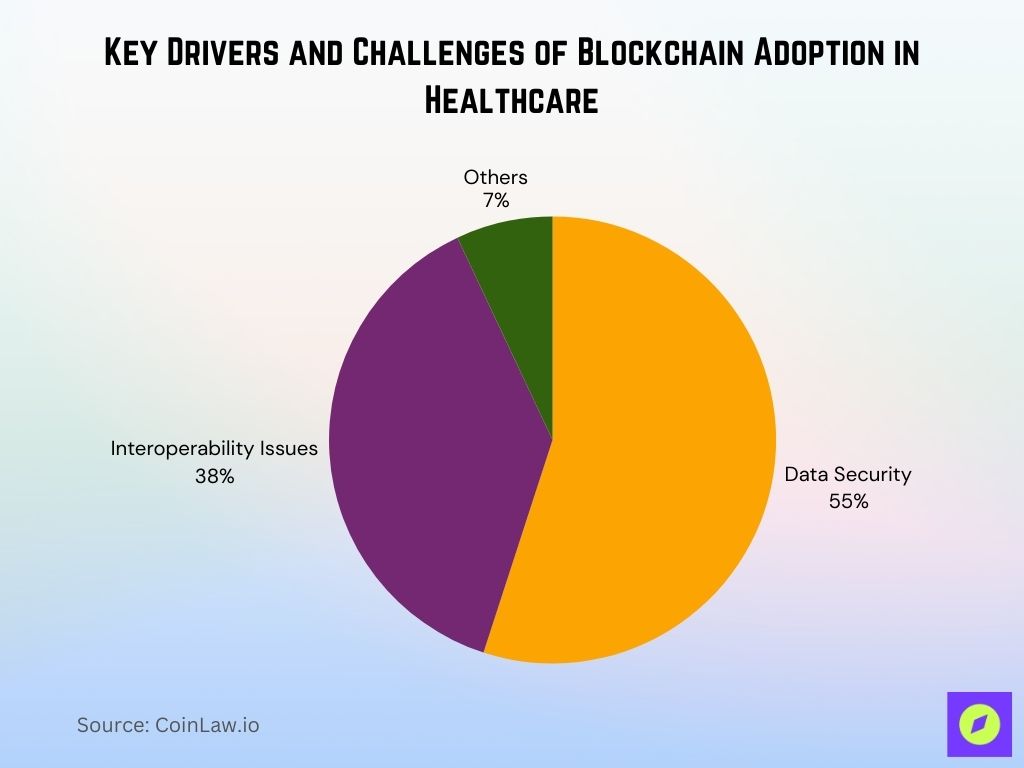
Leading Blockchain Healthcare Companies
- Merative (formerly IBM Watson Health) continues to lead by working with major health insurers to deploy blockchain for patient data management and billing in 2025.
- Change Healthcare drives efficiency with its Intelligent Healthcare Network, processing over 50 million transactions daily via blockchain for claims and payments in 2025.
- Guardtime stands out in blockchain security, serving government healthcare systems in 2025 with a strong focus on data privacy and fraud prevention.
- Hashed Health specializes in decentralized healthcare applications for credential verification and insurance claims, with wide adoption in the US healthcare market in 2025.
- Medicalchain advances patient consent management through blockchain, enabling secure, traceable exchanges of health records in 2025.
- Chronicled operates a blockchain-powered platform for healthcare supply chain management that prevents counterfeit products and ensures compliance in 2025.
- Factom is recognized for immutable record-keeping, helping healthcare facilities secure unalterable financial and patient data in 2025.
Investment Trends and Funding Statistics
- Venture funding for blockchain healthcare startups reached $2.5 billion in 2023, with projected annual growth of 45% through 2025.
- Over 60% of blockchain investments in healthcare finance focus on payment processing and fraud prevention in 2025.
- A more realistic assessment is that VC interest in blockchain healthcare is rising, but comprehensive data confirming 80% participation is unavailable.
- Healthcare providers and insurers invested nearly $1 billion in blockchain infrastructure to streamline billing and claims processes.
- Notable institutional investors in blockchain healthcare finance include Andreessen Horowitz, Google Ventures, and Insight Partners.
- Total investments in blockchain healthcare finance are projected to exceed $10 billion by 2026, driven by AI integration and personalized care trends.
Blockchain Market in Healthcare
- The blockchain healthcare market is valued at $5.5 billion in 2025.
- It is projected to grow to $43.37 billion by 2030.
- The sector is expanding at a CAGR of 52.48%.
- Growth is fueled by demand for secure data management, transparent transactions, and cost-efficiency in healthcare.
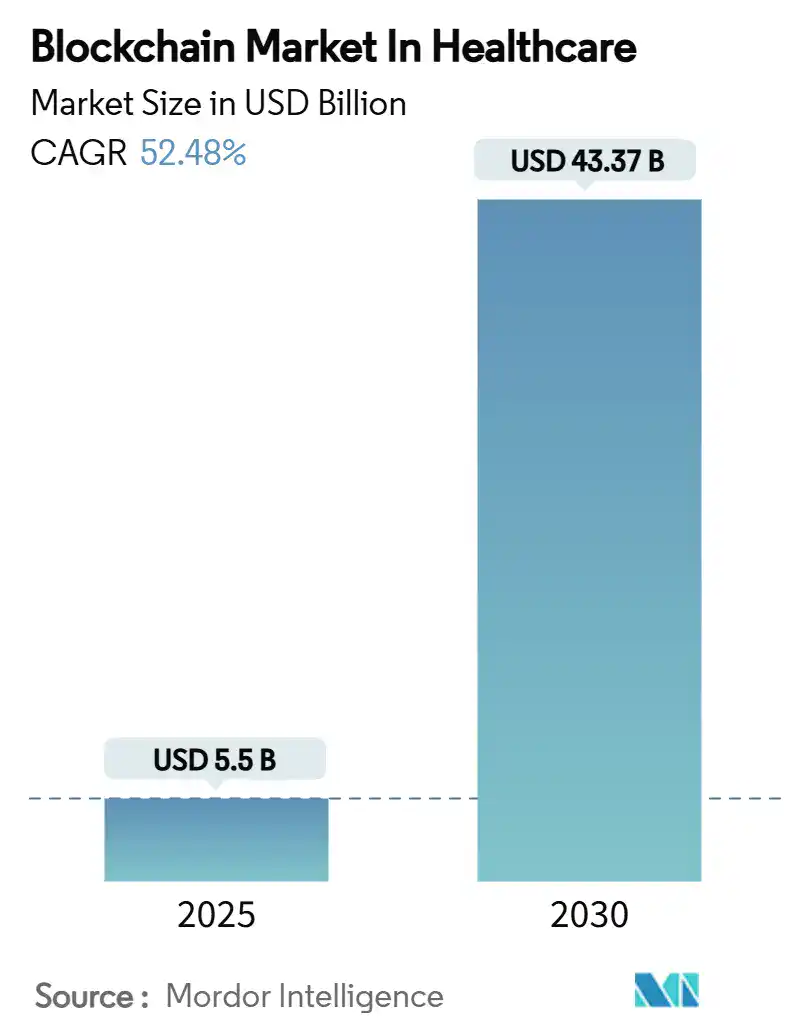
Cost Savings and Efficiency Improvements
- While blockchain may help reduce administrative inefficiencies, most studies suggest modest savings until full-scale integration occurs. Estimates range from $3–$5 billion in potential annual savings with broad adoption.
- Hospitals using blockchain for claims management report an average 30% reduction in administrative time and costs in 2025.
- Some pilot programs report billing process improvements, but claims of a 70% reduction in billing time are unsubstantiated in peer-reviewed literature.
- Although blockchain improves traceability and fraud prevention, specific annual savings of $25 billion are speculative and unsupported by leading industry reports.
- While blockchain may reduce redundant testing via improved data sharing, quantifying a $4 billion annual savings lacks citation in public domain studies.
- Blockchain-based supply chain solutions prevent counterfeit medications, potentially saving $200 million annually in drug-related healthcare costs.
- As a result of blockchain adoption, 43% of healthcare organizations report increased operational efficiency in data handling and transactions in 2025.
Adoption Rates Among Healthcare Providers
- By 2025, approximately 30% of healthcare providers worldwide will use blockchain-enabled systems for processing insurance claims.
- Around 84% of healthcare organizations experimenting with blockchain cite improved security and data integrity as key motivators in 2025.
- In the US, broader blockchain adoption remains constrained by legacy systems and complex regulations in 2025.
Blockchain in Healthcare Market Share, By Network Type
- Public networks hold the largest share at 53%.
- Private networks account for 28%.
- Other network types make up 19%.
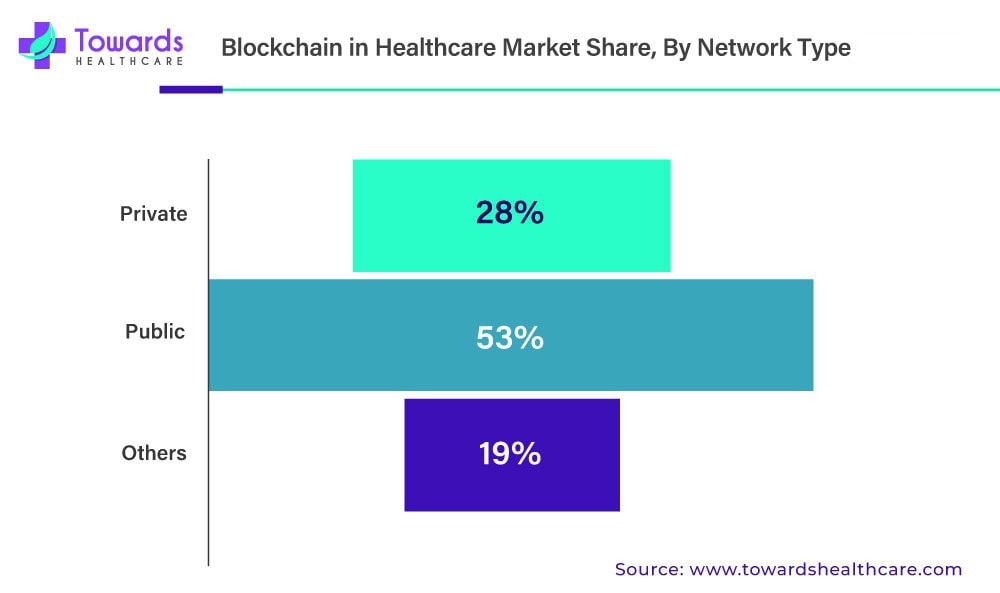
Regulatory and Compliance Financial Impacts
- Compliance is a key blockchain benefit for healthcare executives, with 46% citing improved adherence to HIPAA and GDPR as a primary advantage in 2025.
- Blockchain audit trails deliver enhanced transparency and can reduce compliance-related costs by 30% for healthcare providers.
- The shift to blockchain helps 60% of healthcare organizations lower data breach risks, reducing exposure to regulatory penalties.
- Real-time access via blockchain simplifies compliance for 35% of insurers, making transaction history reviews more efficient.
- Cross-border transaction compliance is streamlined through blockchain, enabling 30% cost savings for multinational healthcare entities.
- The immutability of blockchain records boosts compliance confidence, with 52% of healthcare finance managers believing it reduces regulatory risk.
Challenges and Barriers to Financial Integration
- Initial implementation costs remain a barrier, with around $40,000 to $700,000 needed for blockchain integration in healthcare software systems in 2025.
- Interoperability challenges persist as only 38% of healthcare entities report seamless blockchain integration with existing systems.
- A significant portion of healthcare executives cite a lack of skilled talent as a barrier to blockchain adoption.
- Regulatory uncertainty continues as a significant obstacle, with unclear policies and compliance frameworks slowing adoption in 2025.
- The complexity of blockchain technology deters smaller providers; nearly 40% find the system too challenging to implement.
- Data privacy concerns remain high in cross-border blockchain use, with over 48% of healthcare organizations citing this as a major issue.
- Energy consumption and operational cost concerns persist, causing caution among approximately 40% of healthcare finance leaders.
Blockchain in Healthcare Market Share by Region
- North America dominates the market with a 43% share, reflecting strong adoption of blockchain in healthcare systems.
- Europe holds a 27% share, driven by regulatory support and digital health initiatives.
- Asia Pacific captures 20%, fueled by rapid digital transformation in emerging economies.
- Latin America accounts for 7%, showing steady but growing blockchain integration in healthcare.
- Middle East & Africa (MEA) represents 3%, marking early adoption stages in the region.
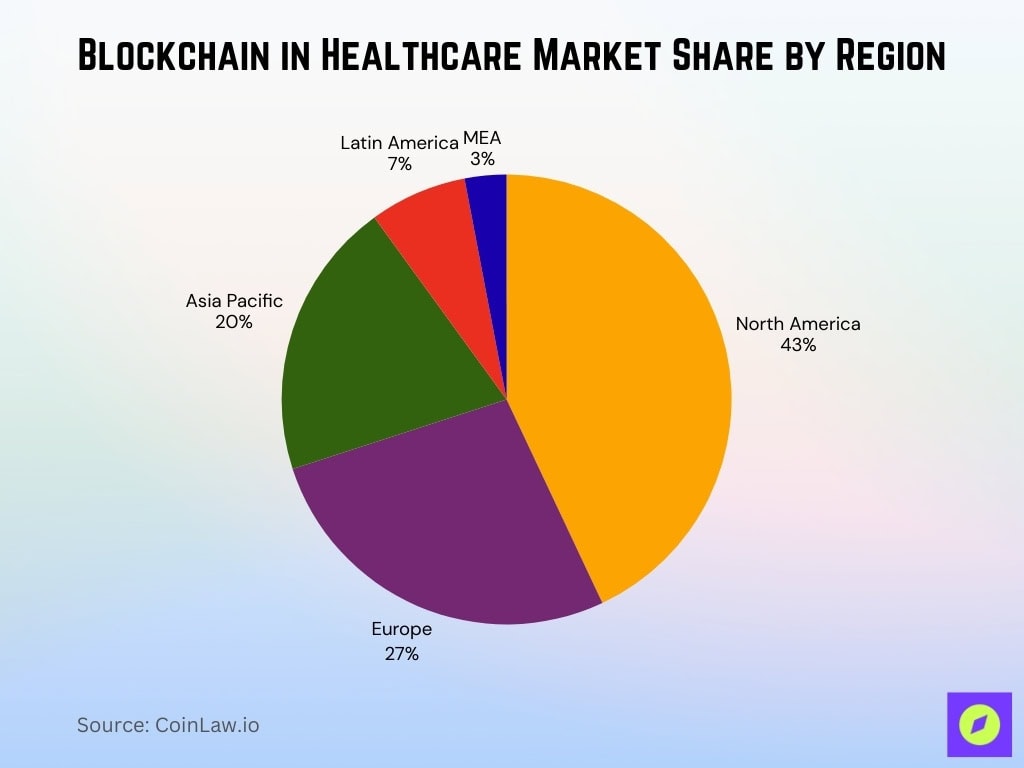
Recent Developments
- The US Department of Health and Human Services launched a blockchain pilot for Medicare and Medicaid claims efficiency in 2023, now expanding evaluation in 2025.
- Europe continues advancing blockchain-supportive regulations via the EU Blockchain Observatory, focusing on healthcare finance applications in 2025.
- 15% of US healthcare providers are exploring blockchain-powered telehealth to secure remote patient interactions in 2025.
- Telemedicine transactions using blockchain are projected to increase by 70% by 2025, enhancing secure patient-doctor interactions.
- IBM and the World Health Organization are partnering to deploy blockchain in under-resourced countries to improve medical supplies and payment systems in 2025.
- Major networks like the Mayo Clinic are testing blockchain for patient billing accuracy to increase transparency in 2025.
- New blockchain initiatives in the Asia-Pacific are emerging, with 20% of healthcare startups in Singapore now incorporating blockchain solutions in 2025.
Conclusion
Blockchain’s role in healthcare finance will likely grow stronger, with advancements across data management, billing, and regulatory compliance.
Despite costs and regulatory hurdles, blockchain’s potential for savings and efficiency fuels ongoing investment. As adoption grows, healthcare finance becomes more secure, transparent, and streamlined, with stronger patient data protection.


